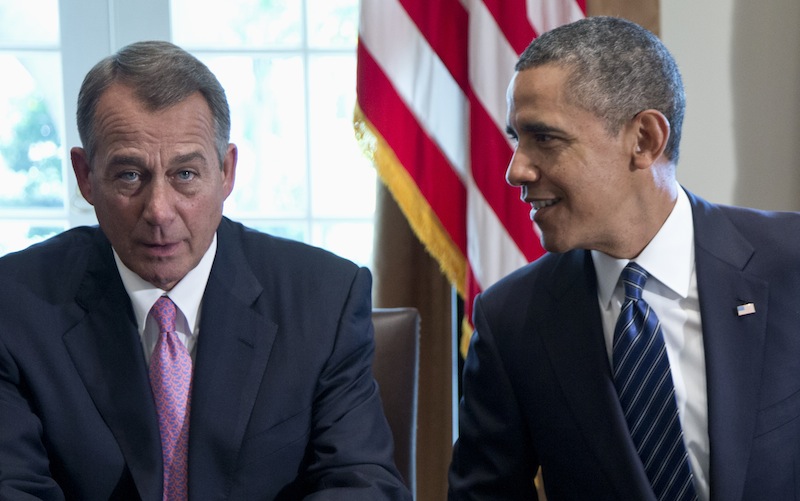On Sunday, President Barack Obama rebuffed Speaker John Boehner’s (R-OH) requests to come to the table and negotiate fiscal reforms in exchange for raising the country’s borrowing authority, which is projected to expire in mid-October.
“I have been through this a couple times with Speaker Boehner,” he said in an interview on ABC’s “This Week,” declaring that while he’s willing to negotiate further deficit reduction, “What I haven’t been willing to negotiate, and I will not negotiate, is on the debt ceiling.”
Boehner has been arguing that many prior debt limit increases have been packaged with fiscal reforms — under Presidents Bill Clinton, George H. W. Bush and Ronald Reagan. Those instances included budgetary compromises from both parties, rather than one side demanding unilateral concessions for not crashing the economy, without the serious threat of default if an agreement wasn’t struck.
“I reminded [congressional leaders] that for decades, the White House and Congress have used the debt limit to find bipartisan solutions on the deficit and the debt,” Boehner told reporters last Thursday. “So President Obama is going to have to deal with this as well.”
The debt limit has traditionally been used as a tool for the party out of power to score political points against the president. But the 2011 standoff, which brought the country within hours of default, disrupted that balance: the party out of power threatened default unless the president gave in to their ideological demands.
Once Obama entered into negotiations at the time, there was no way out. Ever since that debacle, he has been determined not to repeat that mistake. Early this year, when the debt limit deadline was about to come up, he held firm and refused to negotiate, and Republicans folded.
“If we continue to set a precedent in which a president … is in a situation in which each time the United States is called upon to pay its bills, the other party can simply sit there and say, ‘Well, we’re not gonna pay the bills unless you give us what we want,’ that changes the constitutional structure of this government entirely,” Obama told “This Week” host George Stephanopoulos.
Boehner is in an extraordinarily difficult position. His first order of business is to persuade rebellious GOP lawmakers not to shut down the government after Sept. 30 — when the current continuing resolution funding the government runs out — if Obama doesn’t give in to their demands. To talk them out of it, Boehner is floating the possibility of another debt limit standoff, with lofty demands like delaying Obamacare. If Obama’s remarks to ABC are any indication, Boehner’s plight hasn’t shaken the president’s resolve.
“We can’t negotiate around the debt ceiling,” Obama said.
Obama made clear he wants to replace the sequester — across-the-board spending cuts enacted in 2011 — and do more deficit reduction, but not at the risk of breaching the debt limit, and only if Republicans move off their hard-line opposition to new tax revenues.
“I’m happy to have a conversation with him about how we can deal with the so-called sequester, which is making across-the-board cuts on stuff that we shouldn’t be cutting, while continuing tax breaks, for example, for companies that are not helping to grow the economy,” the president said. “There are ways of doing this, it’s just that they haven’t been willing to negotiate in a serious way on that.”
White House aides insist that there are only two possible endgames in the debt limit conundrum: Republicans cave or the country defaults.






